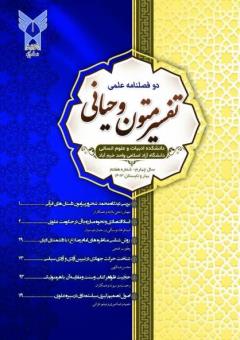رسالت اجتماعی و اخلاقی ادیان: تحلیل تطبیقی تعالیم عدالت اجتماعی در کتب آسمانی
محورهای موضوعی : نقد کلامی و فلسفی موضوعات دینی- اسلامی
1 - دانش آموخته دکترای ادبیات فارسی، دانشگاه اصفهان، اصفهان، ایران
کلید واژه: عدالت اجتماعی, رسالت ادیان, اخلاق اجتماعی, زکات, مسئولیت جمعی, خدمت به نیازمندان,
چکیده مقاله :
این تحقیق به بررسی مقایسهای رسالت اجتماعی و اخلاقی ادیان در قرآن، تورات و انجیل پرداخته و نقش این کتب آسمانی در شکلدهی عدالت اجتماعی، مسئولیت جمعی، و اخلاق اجتماعی را تحلیل میکند. ادیان ابراهیمی فراتر از ابعاد فردی و معنوی، برنامه جامع اجتماعی ارائه میدهند که شامل مراقبت از محرومان، تأمین عدالت اقتصادی، و ایجاد جامعه متعادل است. در قرآن، مفاهیم زکات، قسط، و اصلاح اجتماعی محوریت دارند؛ تورات بر عدالت برای یتیم، بیوه و غریب تأکید میکند؛ و انجیل محبت، خدمت به نیازمندان، و برابری انسانها را برجسته میسازد. این مطالعه با استفاده از تحلیل مضمونی و روش مقایسهای، نشان میدهد که هر سه سنت دینی بر ضرورت عدالت اجتماعی، مسئولیت متقابل افراد جامعه، و ایجاد نظم اخلاقی عادلانه تأکید دارند. نتایج این پژوهش امکان همکاری بینادیانی در حل مسائل اجتماعی معاصر را آشکار میسازد و الهامبخش برنامههای مشترک عدالت اجتماعی خواهد بود
This research examines the comparative social and moral mission of religions in the Qur'an, Torah, and Gospel, analyzing the role of these heavenly books in shaping social justice, collective responsibility, and social ethics. Abrahamic religions, beyond individual and spiritual dimensions, present a comprehensive social program that includes caring for the deprived, ensuring economic justice, and creating a balanced society. In the Qur'an, concepts of zakat, equity, and social reform are central; the Torah emphasizes justice for orphans, widows, and strangers; and the Gospel highlights love, service to the needy, and human equality. Using thematic analysis and comparative method, this study demonstrates that all three religious traditions emphasize the necessity of social justice, mutual responsibility of community members, and creating a just moral order. The results of this research reveal the possibility of interfaith cooperation in solving contemporary social problems and will inspire joint social justice programs.
منابع فارسی:
احمدی، ح. (۱۳۹۹). عدالت اجتماعی در قرآن و کتاب مقدس. تهران: پژوهشگاه علوم انسانی.
پیشوایی، م. (۱۳۹۸). اخلاق اجتماعی در اسلام و ادیان الهی. قم: مرکز انتشارات دفتر تبلیغات اسلامی.
تسخیری، م. ع. (۱۳۹۷). عدالت در ادیان ابراهیمی. تهران: مجمع جهانی تقریب مذاهب اسلامی.
رضائی، ا. (۱۳۹۶). مسئولیت اجتماعی در آموزههای دینی. قم: پژوهشگاه حوزه و دانشگاه.
قرائتی، م. (۱۳۹۵). پیام قرآن: عدالت اجتماعی. تهران: مرکز فرهنگی درسهایی از قرآن.
English References:
Gordis, R. (2018). The root and the branch: Judaism and the free society. University of Chicago Press.
Gutierrez, G. (2019). A theology of liberation: History, politics, and salvation (Revised ed.). Orbis Books.
Hauerwas, S. (2020). The peaceable kingdom: A primer in Christian ethics (3rd ed.). University of Notre Dame Press.
Sachedina, A. (2017). Islam and the challenge of human rights. Oxford University Press.
Sider, R. J. (2021). Rich Christians in an age of hunger: Moving from affluence to generosity (6th ed.). Thomas Nelson.

